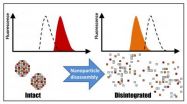(Press-News.org) University students who used a Facebook group as part of a large sociology class did better on course assignments and felt a stronger sense of belonging, according to a Baylor University study.
The study has implications for the challenge of teaching large classes, a growing concern for higher education. Classes numbering hundreds of students — particularly in introductory courses — have become common at many universities, said researchers Kevin Dougherty, Ph.D., associate professor of sociology in Baylor's College of Arts and Sciences, and Brita Andercheck, a doctoral candidate in sociology at Baylor.
Their study — "Using Facebook to Engage Learners in a Large Introductory Course" — was published in Teaching Sociology, a journal of the American Sociological Association.
"Although some teachers may worry that social media distracts students from legitimate learning, we found that our Facebook group helped transform students from anonymous spectators into a community of active learners — and this has important consequences for student performance," Dougherty said.
The Baylor research focused on a class of 218 students in an introductory sociology class at Baylor, a private research university of about 15,000 students. Students who participated in the Facebook group scored higher on quizzes, wrote stronger papers and did better on exams than classmates who did not take part, the study reports.
Baylor researchers noted that participation in the group was voluntary and set up as a "closed group" as defined by Facebook. Only those enrolled in the class were permitted to join. They had to request to do so and be accepted by a faculty administrator. Two-thirds of students in the class ended up joining the group.
Both students and teaching staff provided a steady stream of content to the Facebook group, researchers said. Teaching staff posted discussion questions, links to relevant online material and photos and videos of in-class events such as guest lectures and themed skits. Students, meanwhile, posted their own photos and videos related to course concepts, engaged in discussions and sought solutions to questions and problems.
Students' posts attracted comments and "like" responses from classmates.
"Again and again, we saw students helping one another on the Facebook group," Dougherty said.
One student with food poisoning missed class and posted, "Someone care to tell me what we're taking notes over? I'll be your best friiiiiiend!" A classmate responded less than a minute later.
As final exams approached, students were especially helpful to each other, swapping definitions and examples and organizing informal study sessions.
Because the majority of students access Facebook through a mobile device such as a cellphone or iPad, "the class Facebook Group was almost always with them . . . No student in our class needed assistance using Facebook," researchers wrote.
"A Facebook group extends the classroom in time and space," Dougherty said. "It allows students to interact with one another and with the subject matter wherever and whenever they choose. It makes them more active learners."
INFORMATION: END
Cyberspace scholarship nets higher grades, better thinking for class Facebook group
Baylor study has implications for huge classes
2014-04-28
ELSE PRESS RELEASES FROM THIS DATE:
Newborn Tropical Storm Tapah threatens Saipan and Tinian
2014-04-28
A tropical storm warning is in force for Saipan and Tinian as Tropical Storm Tapah moves north through the Northwestern Pacific Ocean on April 28. When NASA-NOAA's Suomi NPP satellite passed overhead and, imagery revealed a developing eye in Tapah.
In addition to the tropical storm warning, a typhoon watch is in effect for Alamagan and Pagan as Tapah is expected to continue in a generally northerly direction over the next couple of days. A typhoon watch means typhoon force winds of 74 mph or greater are possible within 48 hours. A tropical storm warning means tropical ...
Fluorescent-based tool reveals how medical nanoparticles biodegrade in real time
2014-04-28
Nanoparticles have been heralded as a potential "disruptive technology" in biomedicine, a versatile platform that could supplant conventional technologies, both as drug delivery vehicles and diagnostic tools.
First, however, researchers must demonstrate the properly timed disintegration of these extremely small structures, a process essential for their performance and their ability to be safely cleared out of a patient's body after their job is done. A new study presents a unique method to directly measure nanoparticle degradation in real time within biological environments.
"Nanoparticles ...
A glassy look for manganites
2014-04-28
Manganites – compounds of manganese oxides - show great promise as "go-to" materials for future electronic devices because of their ability to instantly switch from an electrical insulator to a conductor under a wide variety of external stimuli, including magnetic fields, photo-excitations and vibrational excitations. This ultrafast switching arises from the many different ways in which the electrons and electron-spins in a manganite may organize or re-organize in response to such external stimuli. Understanding the physics behind these responses is crucial for the future ...
Ozone levels drop 20 percent with switch from ethanol to gasoline
2014-04-28
A Northwestern University study by an economist and a chemist reports that when fuel prices drove residents of São Paulo, Brazil, to mostly switch from ethanol to gasoline in their flexible-fuel vehicles, local ozone levels dropped 20 percent. At the same time, nitric oxide and carbon monoxide concentrations tended to go up.
The four-year study is the first real-world trial looking at the effects of human behavior at the pump on urban air pollution. This empirical analysis of atmospheric pollutants, traffic congestion, consumer choice of fuel and meteorological conditions ...
Risk of cesarean delivery 12 percent lower with labor induction
2014-04-28
The risk of a cesarean delivery was 12% lower in women whose labour was induced compared with women who were managed with a "wait-and-see" approach (expectant management), according to a research paper published in CMAJ (Canadian Medical Association Journal).
Labour is induced in about 20% of all births for a variety of reasons such as preeclampsia, diabetes, preterm rupture of the membranes, overdue pregnancy and fetal distress. Induction is often thought to be associated with increased risk of cesarean deliveries despite evidence indicating a lower risk. However, much ...
Catastrophic thoughts about the future linked to suicidal patients
2014-04-28
Suicide has been on the increase recently in the United States, currently accounting for almost 40,000 deaths a year. A new study shows that one successful effort to avoid suicide attempts would be to focus on correcting the distorted, catastrophic thoughts about the future that are held by many who try to kill themselves. Such thoughts are unique and characteristic to those who attempt suicide, says Shari Jager-Hyman of the University of Pennsylvania Perelman School of Medicine in the US. Jager-Hyman led a study, published in Springer's journal Cognitive Therapy and ...
Identification of genetic mutations involved in human blood diseases
2014-04-28
A study published today in Nature Genetics has revealed mutations that could have a major impact on the future diagnosis and treatment of many human diseases. Through an international collaboration, researchers at the Montreal Heart Institute (MHI) were able to identify a dozen mutations in the human genome that are involved in significant changes in complete blood counts and that explain the onset of sometimes severe biological disorders.
The number of red and white blood cells and platelets in the blood is an important clinical marker, as it helps doctors detect many ...
Stanford scientists create circuit board modeled on the human brain
2014-04-28
The Neurogrid circuit board can simulate orders of magnitude more neurons and synapses than other brain mimics on the power it takes to run a tablet computer.
Stanford scientists have developed a new circuit board modeled on the human brain, possibly opening up new frontiers in robotics and computing.
For all their sophistication, computers pale in comparison to the brain. The modest cortex of the mouse, for instance, operates 9,000 times faster than a personal computer simulation of its functions.
Not only is the PC slower, it takes 40,000 times more power to run, ...
Using a foreign language changes moral decisions
2014-04-28
Would you sacrifice one person to save five? Such moral choices could depend on whether you are using a foreign language or your native tongue.
A new study from psychologists at the University of Chicago and Pompeu Fabra University in Barcelona finds that people using a foreign language take a relatively utilitarian approach to moral dilemmas, making decisions based on assessments of what's best for the common good. That pattern holds even when the utilitarian choice would produce an emotionally difficult outcome, such as sacrificing one life so others could live.
"This ...
UEA research shows bacteria combat dangerous gas leaks
2014-04-28
Bacteria could mop up naturally-occurring and man-made leaks of natural gases before they are released into the atmosphere and cause global warming - according to new research from the University of East Anglia.
Findings published today in the journal Nature shows how a single bacterial strain (Methylocella silvestris) found in soil and other environments around the world can grow on both the methane and propane found in natural gas.
It was originally thought that the ability to metabolize methane and other gaseous alkanes such as propane was carried out by different ...
LAST 30 PRESS RELEASES:
A biological material that becomes stronger when wet could replace plastics
Glacial feast: Seals caught closer to glaciers had fuller stomachs
Get the picture? High-tech, low-cost lens focuses on global consumer markets
Antimicrobial resistance in foodborne bacteria remains a public health concern in Europe
Safer batteries for storing energy at massive scale
How can you rescue a “kidnapped” robot? A new AI system helps the robot regain its sense of location in dynamic, ever-changing environments
Brainwaves of mothers and children synchronize when playing together – even in an acquired language
A holiday to better recovery
Cal Poly’s fifth Climate Solutions Now conference to take place Feb. 23-27
Mask-wearing during COVID-19 linked to reduced air pollution–triggered heart attack risk in Japan
Achieving cross-coupling reactions of fatty amide reduction radicals via iridium-photorelay catalysis and other strategies
Shorter may be sweeter: Study finds 15-second health ads can curb junk food cravings
Family relationships identified in Stone Age graves on Gotland
Effectiveness of exercise to ease osteoarthritis symptoms likely minimal and transient
Cost of copper must rise double to meet basic copper needs
A gel for wounds that won’t heal
Iron, carbon, and the art of toxic cleanup
Organic soil amendments work together to help sandy soils hold water longer, study finds
Hidden carbon in mangrove soils may play a larger role in climate regulation than previously thought
Weight-loss wonder pills prompt scrutiny of key ingredient
Nonprofit leader Diane Dodge to receive 2026 Penn Nursing Renfield Foundation Award for Global Women’s Health
Maternal smoking during pregnancy may be linked to higher blood pressure in children, NIH study finds
New Lund model aims to shorten the path to life-saving cell and gene therapies
Researchers create ultra-stretchable, liquid-repellent materials via laser ablation
Combining AI with OCT shows potential for detecting lipid-rich plaques in coronary arteries
SeaCast revolutionizes Mediterranean Sea forecasting with AI-powered speed and accuracy
JMIR Publications’ JMIR Bioinformatics and Biotechnology invites submissions on Bridging Data, AI, and Innovation to Transform Health
Honey bees navigate more precisely than previously thought
Air pollution may directly contribute to Alzheimer’s disease
Study finds early imaging after pediatric UTIs may do more harm than good
[Press-News.org] Cyberspace scholarship nets higher grades, better thinking for class Facebook groupBaylor study has implications for huge classes


